- Home
- Brian Garfield
Marshal Jeremy Six #8 Page 10
Marshal Jeremy Six #8 Read online
Page 10
.... Six, watching Steve Lament closely on the long ride, was reminded of distant days along the gamblers’ circuit: Lament was wearing a poker-playing face, there seemed no penetrating the bleak expressionless armor of his gaze. He had said virtually nothing in the past twenty-four hours. Of the others, it had been Elena who had done most of the talking: protestations, querulous demandings, empty threats; finally Vargas had calmed her down. Vargas—gigantic, efficient, competent—had early recognized the realities of the circumstances. He granted Six the respect due a worthy adversary, acknowledged that they meant each other no personal harm and after weighing alternatives and odds, accepted the situation and agreed to follow instructions without challenge, without attempting escape. Before the arrival of Stride and Holly, Six had been outnumbered by his prisoners, but that gave him an unusual advantage: each prisoner was a hostage against the others. Vargas, for example, could not make a break for freedom without putting Elena in jeopardy. Knowing that, and knowing the dangers that faced all of them from Orbea’s loyalist troops, Vargas had cooperated – not happily, but resigned to it. It would serve his own interests best to get Six and Lament to the border as fast as possible, so that he and Elena could rejoin Santana that much faster. Vargas remarked at one point that it was tribute to Six’s reputation that he never doubted Six would keep his word and turn them loose at the border.
That part of it had worked without a hitch for Six – persuading Vargas and Elena to give him at least the cooperation of not fighting him every step of the way. It had been more difficult to work Jericho Stride and Holly Moore into it, because he had not anticipated crossing trails with them in the night. But when he had seen them ride by, recognized Holly’s voice in the dark, he had known immediately he could not let them go on without stopping them. If they had ridden on to Santana’s camp it would not have taken Santana long to decide to tie the two of them up and use them as hostages in exchange for Vargas and Elena. Santana would have sent dispatch riders to his company of men who, even now, followed Six at a discreet distance: he spotted them occasionally, knew they meant him to see them, knew what it meant – Santana was giving him protection from the loyalist soldiers.
And so, knowing he couldn’t let Stride and Holly fall into Santana’s hands, Six had had to persuade them to ride with him. He had thought fast and gambled, offering Stride a chance of amnesty in Arizona against the old assault charge, and telling them that Santana by now had probably broken camp and led his army down from the mountains, so that the only refuge from Colonel Sanderos’ regulars for Stride and Holly would be north of the border. If they stayed here, rattling around the mountains, they would sooner or later stumble across a patrol of loyalist troops and be captured.
Using those flimsy arguments he had somehow persuaded Jericho Stride to join him. He had a feeling it was not his arguments that had swayed Stride so much as Stride’s own uncertainty about Steve Lament: Stride still had not made up his mind about Lament, who like Six was a friend of his. It was possible that once they reached the border Stride might decide to help Lament escape. That was a risk Six had no choice but to face. In the meantime, they all rode together, bound to each other by tenuous threads of hope, danger, uncertainty, and a common enemy … the loyalists.
Six looked over his shoulder and caught Holly Moore staring openly. The pink tip of her tongue darted speculatively between her lips; a tentative smile briefly crossed her face. The long fall of her hair framed her eyes delicately and once again he was struck by the uncanny way she reminded him of Clarissa....
They made a brief midmorning halt to rest the horses. The sun reached down into the canyon; Six chewed a strip of dried beef, standing at the head of a clearing with his attention moving restlessly from face to face. Holly Moore moved close to him, stood with one arm against the trunk of a pine and said quietly, “I half expected I’d never see you again – I guess revolutions play funny tricks..”
Six nodded absently. His eyes roved the clearing. Jericho Stride walked over to them, swigging from a canteen. His face was black, unreadable under the shadow of his hatbrim. Holly looked at him and said tartly, “I’ve never seen two filthier wrecks than you and me. I wish I had some respectable clothes. And you—”
She left it hanging, unfinished; Stride said, “Hell, I changed my clothes before we left town the other day.”
Six listened with half his attention. He was watching the others. Lament sat under a tree by himself, brooding into space. Vargas and Elena were talking in low tones, probably about her uncle – his death, reported by Holly and Stride last night, had been a hard blow to her; Vargas had been trying to comfort her ever since.
Holly, following the direction of Six’s glance, said gently, “She’s going through a private patch of Hell, I guess. I wish I’d known he was her uncle, I wouldn’t have sprung it like that last night.”
“Not your fault, honey,” said Stride.
“What do you know about it, you big oaf? Her uncles dead, her world - that ranch of theirs - all burned up. She’s afraid Santana will get killed and it’ll all be for nothing. She must love Santana hot and deep, Jericho – there’s nothing like being in love when you’re young and haven’t learned to hate yourself yet.”
“You don’t hate yourself, Holly.”
“Don’t I?”
“No. I guess you’ve had to hike through some rough spots and maybe you took a few wrong forks, but you’re all right. You’ve never hurt anybody.”
“Jericho,” she answered bitterly, “I hurt everyone I touch. You ought to know that by now.”
“You hear me complaining?”
“If you weren’t such a softhearted idiot you would.” Stride chuckled amiably. Holly shook her head. “I don’t know, Jericho, every time I find something that looks good to me I start prying up the edges until I get it all bent out of shape. Everything goes sour.”
“Take it easy,” Stride said.
“That’s easy for you to say … you’re so damn tough. Why can’t I be tough like that?”
“It doesn’t help much,” Stride said softly. “If you’re tough enough, yeah, maybe it’ll help keep you from getting hurt. But tough people can have thin skins too.”
“Can they?” she breathed, musingly; she turned, stirring, and Six saw the deep color of her eyes. “I still want that millionaire, Jericho. It’s all I’ve got left.” She put a smile on her face.
.... The night came on them moonless, a sky carpeted with broken clouds that let only a little starlight through, and when they stopped to eat and feed the tired horses, Steve Lament began to stir out of his sluggish torpor. He thought to himself, I came into this damned world fighting and that’s the way I’d like to go out. He had changed his mind, sometime in the course of the day, for reasons he did not altogether understand; now, accepting it without puzzling it over, he set about planning his break.
It shouldn’t be too hard. Last night’s rain had soaked the ropes that bound his wrists; when they had started to dry out he had complained of the tightening, and Six had loosened the lashings obligingly, perhaps lulled by Lament’s steady indifferent lethargy. Lament was a gaunt man with supple, clever hands; he tested the ropes once again, and had the feeling he could eel out of them without scraping off too much skin. After that, he would have to get his hands on a gun … and so, like a man waking out of deep sleep, he began to study the little gathering, putting bits and pieces together in his mind, starting to lay his plan.
Jericho Stride picked a hasty path through the rocks to the shadows where Six stood vigilantly on watch; Stride hauled up, breathing fast, and said, “Fires lighting up.”
“Where?”
“Come have a look.” Stride led the way back up through the rocks. It was a steep quick climb; both men were winded when they reached the top. “Yonder,” Stride said.
Beyond the nearby mountain hung heavy clouds. Their heavy underbellies reflected a faint red glow, thrown up from the earth below. “Campfires,” Stride said. “May
be three or four.”
“Not likely to be Santana’s men,” Six observed.
“I make it to be just over that peak. Maybe four miles from here. A little close for comfort, Jeremy.”
Six squinted toward the red-painted clouds and Stride remarked, “Wouldn’t be more than a five, six mile ride by way of that pass over there.”
“All right. Have a look.”
They went back downhill to the horses. Holly came up and Stride spoke softly, quickly to her; when he mounted up, carrying his rifle, Holly said, “Take care, Jericho.”
“Yeah,” Stride said, and left them behind, setting off at a ground-eating jog. A thin rind of moon stood tipped on end just above the eastern horizon; it had appeared within the past few minutes.
There was no trail; once he had to turn back and pick another route out of a blind canyon. A little creek ran thin down the slope from a rock-hidden spring; he clattered across the rocky bed and then the horse was straining up against a hard pitch toward the timbered pass. A carpet of pine needles muffled the sound of his travel. He had to duck under low branches while he picked a careful path through trees so tall and heavy that hardly any moonlight at all penetrated to earth. Twice he had to dismount and lead the scratching horse up a slope too steep to ride. Here the bedding of needles made slippery going and he slipped back, skidding, gaining ground only slowly. Making enough racket to wake the dead, he thought sourly.
It was a couple of miles yet; they wouldn’t have heard him unless they had outriders. He wondered who it was … loyalistas? For all he knew it was a wild pack of mountain Yaquis; but it would do to find out.
The fires were going down; the pink glow on the undersides of the clouds was almost gone. He achieved the head of the pass, rode through it, and found himself on a faintly moonlit flat. On either side lifted the peaks, jagged and impassable. A faint trace-game trail or Indian path – cut across the flat at an angle. He put his horse onto it and rode across the brief clear stretch and suddenly found himself on the verge of a steep drop that fell away into shadowed obscurity.
Mountain goats, he thought, but I don’t know about a horse.
He stepped down, took a short grip on the reins, and led the horse forward.
The narrow trail curled down the cliff at an angle, ledging back and forth. Stride felt his way with one hand against the wall. Here and there a gnarled shrub grew out of the cliff. The trail was worn into the slope; in places the edge was shored up by small rocks. Man-made trail, he thought. And, he was thinking, he would have to come back up the same way - he hoped he wouldn’t have a pack of Indians or soldiers on his heels.
The trail reached a turning, doubled back on itself, and continued downward, switchbacking, with no bottom yet in sight. Then, suddenly, it turned a corner of the cliff and moved outward; without warning Stride found himself climbing a gradual incline on a hillside. He mounted up and rode forward, letting the horse find the way. In a little while he reached the rim of the cliffs sullen shadow and rode into the pale swatch of moonlight. A wall of timber confronted him: he threaded his way into it, still on the trail. A hunting owl swooped by hooting. The faint hazy glow on the cloud-bottoms was all but extinguished. At the crest of the hill Stride dismounted and tied his horse and went foward afoot.
A sprawl of rocks led away from the trees. He moved with care, to avoid dislodging loose stones. Belly-flat, he wormed up until he raised the lights below.
First he searched the higher shadows. Something moved off to the right … sentry, he judged. There was another one on the opposite slope. The horses were down below.
He counted four fires and after five minutes had made out seventeen bedrolls. Two guards in sight and possibly a third man with the animals – twenty men all told.
And he saw wheels down there. It looked like a cannon.
But longer inspection told him it was not. He had seen one once at Fort Griffin; he remembered it well:
Gatling gun.
I’ve seen enough, he thought. Time to move out. But he stayed a bit longer. One man below got up to feed one of the fires; it was a chilly night. Stride frowned in the dark and reasoned carefully to himself: Nobody but the army would have a Gatling gun. It’s got to be Colonel Sanderos’ butchers down there. But what the hell are they doing way up here in the Sierra?
He left the way he had come – silently on his belly; when he reached the trees he stood up and walked back to the horse. He took the trail away at a faster pace than he had come; he felt a sense of urgency.
Thirteen
With Stride away from camp and Vargas taking a catnap it seemed the best time for Steve Lament to make his break. Now or never.
He had his eyes unblinkingly on Jeremy Six, who stood fifteen feet away or so. The camp was a shallow bowl among shoulder-high rocks that crowded the district. Wizened shrubs grew among the yellow rocks; shelves of pale rock thrust away from the earth at improbable architectural angles. Six was ever vigilant; but sleeplessness was beginning to tell on him, and he had to watch not only Lament but the entire countryside roundabout, constantly alert for loyalist soldiers. There had to be moments when Six would be looking the other way. With his hands free behind him, one wrist throbbing where he had scraped the flesh raw squirming out of the lashings, Steve Lament waited for that moment when Six would be distracted enough to look away.
In time it came, as it had to. Six began to turn a slow full circle on his heels to sweep the near horizons with his glance and his ears. When Six was in profile, Lament made his move … crouching, wheeling low toward the saddle beyond Vargas’ huge slumbering shape. It was only a few feet away....
.... Six completed his turn and stiffened: something was wrong, out of place - then he saw Lament moving in the shadows, crouching, vague and dim against the heavier mass of rocky shadows just beyond Vargas. Something glinted in Lament’s hands.
Six whipped his gun up into his fist; he said, in a cool quiet voice, “Freeze.”
Lament’s unhurried voice came back at him from the shadows: “Too late, Jeremy. I’ve got your rifle cocked and aimed at you. Mexican standoff, amigo.”
Six moved a pace forward; Lament said quickly, “I don’t want a fight, Jeremy. If you drop that gun I’ll just get on a horse and ride away … no shooting. My word on it.”
Neither of them had raised his voice, but the talk had roused the others. Vargas was up on one elbow, growling in a half-sleep; Six heard the women stirring behind him, heard Elena’s puzzled questions.
With a cold sour feeling of resignation, Six said, “Can’t let you do it, Steve. Drop the rifle or make your play. You won’t get out of this camp except over my corpse.”
Slowly, Lament straightened to his full lean height. Easier to see against the higher rocks, he braced the rifle against his side ribs. The range was no more than fifteen feet; neither man could miss, even in this bad light. A corner of Six’s mind abstractedly warned him that if Lament shot first there was little chance he would be able to return the fire. And so it was imperative that Lament not get the first shot.
“Drop it, Steve. Last chance.”
It was at that moment that a cloud, drifting across, moved past the moon. Lament’s hatless face came into better view. The rifle gleamed dully, lancing fragmentary reflections. Lament said bleakly, “I didn’t want this, Jeremy, but all right—”
It happened very fast, then: Lament’s finger went white on the trigger, the gunman’s careful squeeze in place of a jerk; on that signal, with no choice, Six fired. But in the split instant of firing he saw Lament’s eyes move, flashing past toward something behind Six, and Lament’s mouth began to form a word while his finger opened away from the trigger … all that in the broken moment of time during which Six, with the muzzle of that rifle dead-center against his chest, pulled off his own shot and saw it take Lament high on the right side of the breastbone.
The rifle fell from Lament’s hand, unfired, clattering on rock; Lament spun back hard against the boulders and stood there
, both knees bent, for a little while before he began to sink to the ground. All the while, Lament kept shaking his head: “No … No!”
Six dropped his revolver back into its hip scabbard and crossed the intervening distance with five long strides. Down on one knee by Lament, he reached for the man’s jacket to pull it open; he said, “I didn’t shoot to kill you.”
“Jeremy—”
“I could have told you about that rifle,” Six said. “Got a hard trigger pull. I’ve been meaning to fix it.”
“I am damned glad you didn’t.”
“What?”
Lament lifted a hand weakly, gestured limply past Six. “I couldn’t do it twice, Jeremy.”
Six said again, “What?” He looked over his shoulder, saw Elena standing at the far end of the rock bowl, one hand to her mouth. Holly was coming forward in a hurry from the opposite corner.
Lament said, “Elena - right in the line of fire. I couldn’t do it anyway, Jeremy, but I’m glad you didn’t have a hair trigger on that rifle.”
Six said slowly, “Is that the way it happened with Clarissa, Steve?”
“Like that,” Lament said. “Only the light was bad and I didn’t even know she was there, Jeremy. I swear to God.”
“You didn’t say a word about that.”
“Maybe I didn’t want to make excuses. I did kill her, Jeremy, and I’d had a warm place in my heart for Clarissa half my life. Maybe I wanted you to hang me for it.”
“So you said nothing.”
Holly Moore was at Six’s elbow, shoving him aside. “Get away from him and let me have a look before the poor fool bleeds to death while the both of you spend half the night talking each other’s ears off. I never saw the like.”

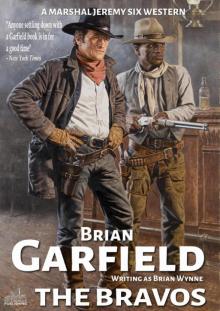 Marshal Jeremy Six #3
Marshal Jeremy Six #3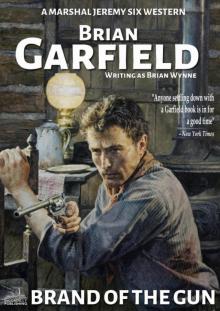 Marshal Jeremy Six #6
Marshal Jeremy Six #6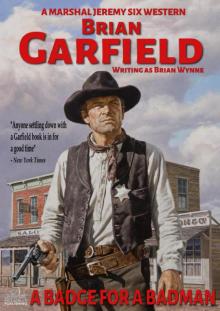 Marshal Jeremy Six #5
Marshal Jeremy Six #5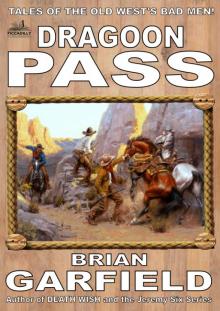 The Outlaws 2
The Outlaws 2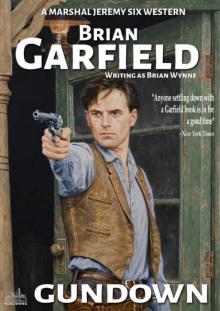 Marshal Jeremy Six #7
Marshal Jeremy Six #7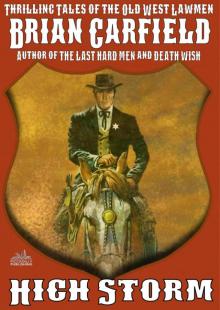 The Lawbringers 4
The Lawbringers 4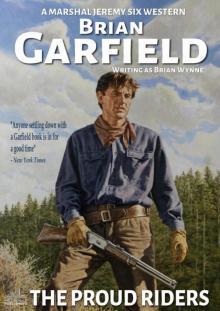 Marshal Jeremy Six #4 the Proud Riders
Marshal Jeremy Six #4 the Proud Riders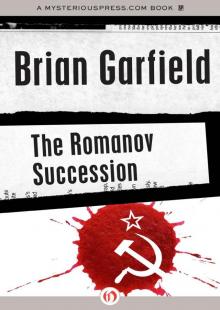 The Romanov succession
The Romanov succession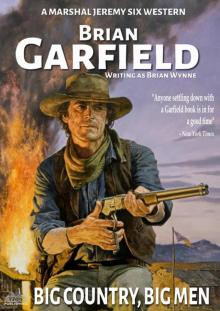 Marshal Jeremy Six #8
Marshal Jeremy Six #8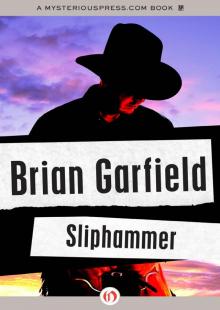 Sliphammer
Sliphammer Line of Succession
Line of Succession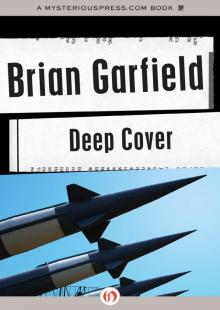 Deep Cover
Deep Cover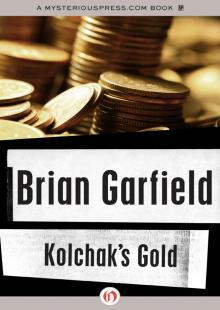 Kolchak's Gold
Kolchak's Gold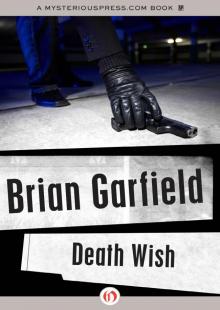 Death Wish
Death Wish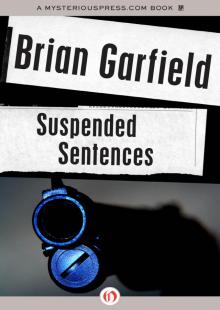 Suspended Sentences
Suspended Sentences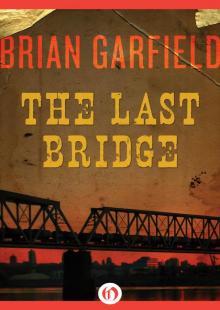 The Last Bridge
The Last Bridge Relentless
Relentless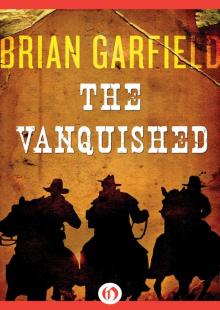 The Vanquished
The Vanquished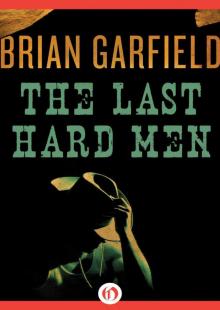 The Last Hard Men
The Last Hard Men Hit and The Marksman
Hit and The Marksman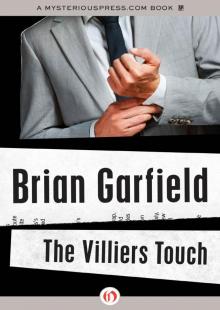 Villiers Touch
Villiers Touch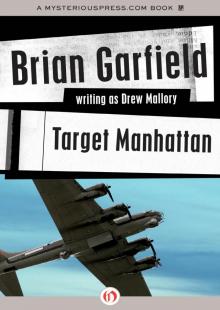 Target Manhattan
Target Manhattan Marchand Woman
Marchand Woman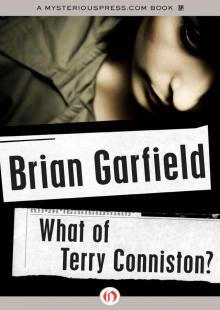 What of Terry Conniston?
What of Terry Conniston?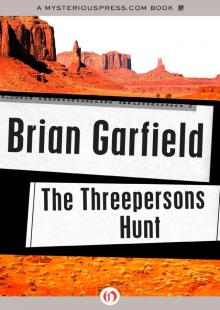 Threepersons Hunt
Threepersons Hunt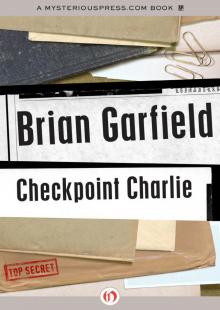 Checkpoint Charlie
Checkpoint Charlie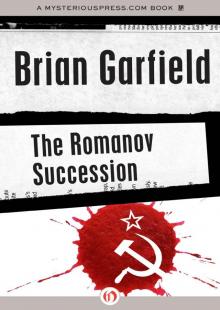 Romanov Succession
Romanov Succession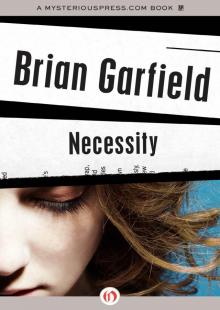 Necessity
Necessity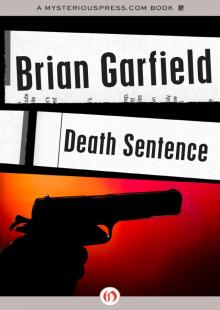 Death Sentence
Death Sentence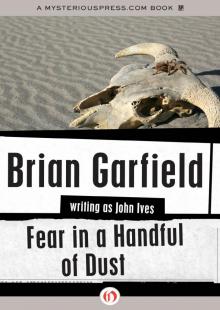 Fear in a Handful of Dust
Fear in a Handful of Dust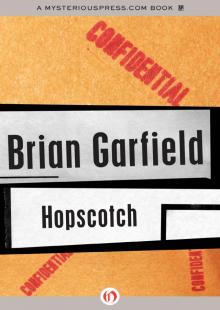 Hopscotch
Hopscotch